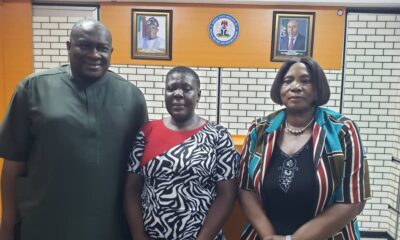News
34 States Domesticate Child Rights Act
The Child Rights Act, which addresses issues including child abuse, child labour, forced marriage, and other challenges in Nigeria, has now been domesticated by 34 of the 36 states that make up the federation, Minister of Women Affairs Pauline Tallen has disclosed.
She said the remaining two states which she refused to mention have given assurances that the Act will be domesticated in their states before the year runs out.
The proposed law named “The Violence Against Persons Prohibition Act (2015)” had been domesticated by just 13 states as of 2019, raising concerns in government and child rights circles.
“We have made progress on the domestication of the Child’s Right Act 2003. When I assumed office, we had only 12 states that have domesticated the Child’s Right Act and without the Act, we cannot achieve our desire of educating female children.
“With the Child’s right Act, the girl child is guaranteed to be in school up to senior secondary school, minimum when she will be about 17-18 years and by then, she would have crossed the early marriage stage,” she added.
Tallen, who appeared at the 59th edition of the Ministerial Media Briefing organised by the Presidential Communications Team at the Presidential Villa, Abuja, yesterday, said the outcome is a result of active advocacy to ensure that all states key into the initiative.
The minister said she had personally met with key stakeholders and speakers of State Houses of Assembly to stress the need for them to pass the bill into law for their governors to assent to.
Tallen said: “We go to the traditional rulers, we go to community leaders, we go to religious leaders, and we go to the state assemblies.”
She also noted the leadership of President Muhammadu Buhari provided in the effort to have all states domesticate the act, complemented by the First Lady, Aisha Buhari and the Forum of First Ladies.
The minister said cases of Gender Base Violence is on the increase daily and urged men to join the fight against the scorch, saying it was the reason the UN system instituted the He4She slogan and decorated Nigerian leaders including President Muhammadu Buhari and Vice President, Yemi Osinbajo, who believe without women they cannot get it right.
“As I said the world is now taking the face of a woman and is addressing gender balance. Without having more women at the decision table, we can never get it right. Once we have women, the difference will be clear because men cannot know it all, and that was why woman was created by God. So, ignoring women is going against the will of God.”
She disclosed that as of November 22, 2022,out of 11,053 reported gender-based violence, 401 ended in fatality, 33 perpetrators have been convicted, 592 cases have been closed, while 3,507 cases are still open.
“We have a total of 11, 053 cases of gender-based violence reported, fatal cases, 401, closed cases, 592, very sad and we had only 33 persons convicted for this deadly act and that is unacceptable and that is why we are calling on the justice system to act fast on cases of gender-based violence because justice delayed is justice denied,” Tallen stated.
The minister also disclosed that under Nigeria for Women Project, supported by World Bank over N3billion has been disbursed to 67,358 women beneficiaries.
She added that A total number of 6,142 beneficiaries from the eight pilot States have profited from the disbursement of the National Women Empowerment Fund (NAWEF), a micro-credit intervention Fund to provide loans up to N100,000.00 to women in collaboration with the Bank of Industry.
The beneficiary states are Abia State – 644; Adamawa State – 791;AkwaIbom State – 939;Borno State 1,074;Jigawa State – 442;Nasarawa State – 388;Osun State – 174; and Yobe State – 1,690.
The minister, who emphasized that girl child education is key in all societies, used the occasion to call on parents to ensure that they train their girls to at least secondary school level before giving them out for marriage.
“The education of the girl child is key to the ministry without education, you can’t get it right. Education is top on our agenda and that is why we work hand in hand with the Ministry of Education because that is what will equip the woman for life.
“Without education, we will not have women representing us at the international level. Without that, Amina Mohammed wouldn’t have been there making us proud at the UN, likewise, Dr NgoziOkonlo-Iweala would not have been at the World Trade Organization.
“I’m happy because the President of Nigeria, MuhammaduBuhari has insisted that every Nigerian child deserves to be educated especially the girl child. When you educate a woman, you educate the family and society at large but when you educate a man, you are educating a single person,” she said.
News
Fubara Attends PDPGF Meeting In Asaba …..Back Court Verdict On National Secretary Position

Rivers State Governor, Sir Siminalayi Fubara, last Friday, attended the Peoples Democratic Party Governors’ Forum (PDP-GF) meeting in Asaba, the Delta State capital.
The Rivers State Governor, who is the Vice Chairman of the PDP Governors’ Forum, attended the meeting, alongside 10 other Governors of the party’s controlled states across the six geopolitical zones of the country.
The first PDPGF meeting in 2025, was held at the Government House in Asaba, at the end of which a seven-point resolution was reached.
Reading the communique at the end of the meeting, the Chairman of the Forum, and Governor of Bauchi State, Senator Bala Mohammed urged the National Working Committee (NWC) to put every machinery in place to ensure a hitch-free NEC meeting on March 13, 2025.
The communique stated:
“The Forum, having examined all the notices required by law to be given to validly convoke NEC, advised NWC to reschedule NEC to the thirteenth (13Th) of March 2025.”
The Forum further noted the Court of Appeal judgment affirming Udeh Okoye as the National Secretary of the party, saying that as a party that believes in the rule of law, it will respect the position of the Appellate Court on the matter.
“The Forum noted with delight the ongoing efforts at resolving the crisis in the National Working Committee, NWC, on the position of the National Secretary, and has reaffirmed its support for the Court of Appeal judgment; consequently, the Forum advised the NWC to set up the machinery for the effective implementation of the court judgment.
“While commending the country’s valiant and patriotic Armed Forces and Security Agencies for maintaining the frontline in securing the country and the gains of our gallant personnel against bandits in parts of the country, the Forum viewed with deep concern, the resurgence of brazen non-state actors. It, therefore, calls for the strengthening of the nation’s security architecture.”
Governors in attendance include: H.E Senator Bala Abdulkadir Mohammed (Bauchi State); H.E Sir Siminalayi Fubara (Rivers State) – Vice Chairman; H.E Rt. Hon. Sheriff Oborevwori (Delta State) – Host; H.E Dr. Agbu Kefas (Taraba State); H.E Rt. Hon. Ahmadu Umaru Fintiri (Adamawa State); and H.E Dr. Dauda Lawal (Zamfara State).
Others are H.E Senator Ademola Adeleke (Osun State); H.E Senator Douye Diri (Bayelsa State); H.E Pastor Umo Eno Ph.D (Akwa Ibom State); H.E Dr. Peter Mbah (Enugu State); H.E Barr. Caleb Mutfwang (Plateau State);
and H.E Bayo Lawal (Deputy Governor, Oyo State), who represented Governor Seyi Makinde.
News
NGO Implants Free Pacemakers Into 22 Cardiac Patients In PH
A United States based Non Governmental Organisation, Cardiovascular Education Forum, in collaboration with the University of Port Harcourt Teaching Hospital (UPTH), has successfully implanted free pacemakers into 22 patients with different cardiac cases in Port Harcourt.
This is in a bid to save lives and encourage patients with low heartbeats to live longer.
The implantable device, which costs $20,000 each, was inserted free of charge on the selected patients.
Speaking during a Special Hospital Ground Rounds at the UPTH with its Theme, “Recent Advances in Cardiac Pacing,” a cardiac Physiologist, Dr Neil Grub, said the NGO was in Nigeria to improve training and learning on cardiac issues and help patients with cardiac problems.
Accompanied by a team of experts comprising a cardiologist and cardiac device implanter, Dr Jagdeep Siagh, and UPTH interventional cardiologist, Dr Edafe Emmanuel, Dr Grubb said pacemakers were inserted on patients with low heartbeats to boost their heart rates.
Earlier, the Chief Medical Director, UPTH, Prof Henry Arinze Ugboma, said each of the implantable devices cost over $20,000.
Ugboma, represented by the Chairman, Medical Advisory Committee, UPTH, Prof Datonye Alasia, said the partnership between UPTH and the foreign NGO was to build networks, and improve services in terms of healthcare delivery, training and learning.
According to him, there is now a ray of hope in terms of treatment of patients with cardiovascular cases in the hospital.
He said the UPTH started the collaboration with Cardiovascular Education Forum in 2018 to boost health, training and learning on cardiac health.
He assured that, “in coming years, the scale of our collaboration with the mission will be higher.”
Chinedu Wosu
News
FG Unveils National Broadband Alliance To Drive Internet Access
The Federal Government has unveiled the National Broadband Alliance, a new initiative aimed at transforming the nation’s digital infrastructure and boosting connectivity across the country.
The initiative was unveiled yesterday in Lagos by the Minister of Communications, Innovation, and Digital Economy, Bosun Tijani, who was represented by the Executive Vice Chairman of the Nigerian Communications Commission, Aminu Maida.
In his address, Tijani stated that NBAN would significantly enhance broadband penetration, which has grown from just six per cent in 2015 to approximately 42 per cent as of October 2024.
To support this agenda, he said the government was leveraging a Special Purpose Vehicle to deploy 90,000 km of fibre backbone across the nation, connecting underserved and rural communities to high-speed internet.
According to him, the initiative aligns with the Renewed Hope Agenda of President Bola Ahmed Tinubu, which prioritises innovation, technology, and collaboration as key drivers of national prosperity.
Tijani stated that the expansion would not only improve access to reliable broadband but also empower Nigerians, particularly in rural areas.
“While the progress made in broadband penetration is commendable, we recognise that much more needs to be done to ensure every Nigerian can enjoy the benefits of reliable, high-speed internet,” Tijani said.
The minister also emphasised the importance of strategic partnerships with donors, investors, and other key stakeholders in achieving the goals set out in the National Broadband Plan (2020–2025).
He said these collaborations would be essential in overcoming infrastructure development challenges and making broadband affordable and accessible for all Nigerians.
“These targets reflect our unwavering commitment to ensuring that broadband is accessible, affordable, and inclusive for all Nigerians. However, we are also aware of the challenges ahead,” he added.
Tijani stressed that achieving the government’s targets—70 per cent broadband penetration by 2025, a minimum internet speed of 25 Mbps in urban areas, and broadband access for 80 per cent of the population by 2027—will require sustained efforts.
“Achieving these goals will require more than just the efforts of the private sector. It will require a holistic approach that includes strategic partnerships with donors, investors, and other key stakeholders in accelerating the rollout of critical infrastructure,” he said.
-

 News6 hours ago
News6 hours agoNigeria Strengthens Economic Ties With Germany To Boost Investment, Jobs
-

 Featured3 hours ago
Featured3 hours agoFubara Flags Off Upgrading Of 135 Primary Healthcare Facilities In Rivers
-
Rivers4 hours ago
Bonny Protest Neglect, Seeks CSR MoU Implementation
-
Nation2 hours ago
FG Begins Tolling On Abuja-Keffi-Akwanga-Makurdi Highway
-
Business4 hours ago
NDYC Seeks NDDC Commercialisation … Uncompleted Projects Completion
-

 Rivers6 hours ago
Rivers6 hours agoCommissioner Promises Improved Working Conditions … Splashes N.1m On Outstanding Caregiver
-
Sports3 hours ago
Sports: 2nd Edition Of Inter-Tribal Tourney Kick-starts In Mbiama
-
Niger Delta4 hours ago
NACAT Inaugurates South-South Office In A’Ibom Against Corruption

